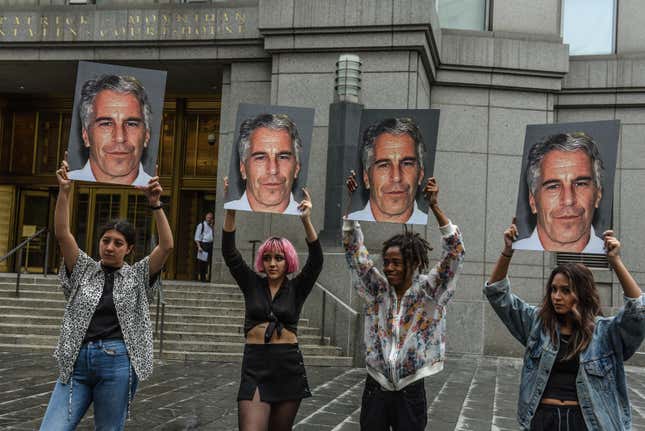The Real Jeffrey Epstein Scandal Has Unfolded In Front of an Indifferent Public For Decades
Latest
In 2016, before Jeffrey Epstein was simply another dead pedophile, he was free and alive, and a small group of men were trying to peddle an Epstein-related hoax that should never have been possible to perpetrate. Those men were shopping a wild story around to various media outlets, including this one, claiming that Donald Trump had raped a 13-year-old girl at an Epstein-hosted orgy. The men were able to try to peddle that story because Epstein was—for an infuriatingly long time, due to a profound miscarriage of justice—allowed to go without more than a polite wrist-tap for his obvious, outrageous, widely acknowledged crimes against teenage girls.
And just when it seemed that Epstein was actually going to be held accountable for those many, well documented offenses, yet again, he’s escaped. Epstein’s apparent suicide this week—and the conspiracy theories and bad media coverage around it—obscures the real scandal as it was just beginning to emerge. At some point, perhaps, if we’re very lucky, the overheated speculation around Epstein’s death may turn to introspection. It might be worth asking ourselves, for instance, why the public is so much more engaged by Epstein’s bizarre jailhouse death than in listening to his living victims, or questioning the many shameless hucksters who have tried to use their pain for their own political and financial ends. In part, that’s because Epstein’s case has been inextricably linked with conspiracy for such a long time, making it near impossible for the lived experience of his victims to ever be fully heard over the din.
In 2005—14 years ago—a 14-year-old Florida girl and her parents told police she was coerced into accepting money to give him a sexual massage at Epstein’s mansion. That first story soon sprawled into a larger criminal case: in sworn statements, the teenager and several others said they’d been given cash to massage Epstein, massages that sometimes ended with him sexually assaulting them. (In the 2006 New York Times story about the case, the paper writes that a few girls said “he had penetrated them with his fingers or penis,” which is clearly defined as felony sexual battery under Florida law, and is a weirdly indirect way for the paper to phrase things.) The socialite Ghislaine Maxwell has been accused of procuring victims for Epstein, alongside a group of other former Epstein assistants, charges they have all denied.
It might be worth asking ourselves, for instance, why the public is so much more engaged by Epstein’s bizarre jailhouse death than in listening to his living victims
As the Miami Herald’s blockbuster reporting later made clear, though, almost as soon as Epstein was charged, he was wriggling off the hook, negotiating an extraordinary deal with the office of then-U.S. Attorney Alexander Acosta which allowed him to plead guilty to a state charge of soliciting minors for prostitution, a deal which required him to register as a sex offender and pay restitution, but didn’t end in him being federally charged.
According to his accusers, the abuse was far worse than what was outlined in the initial case. In 2015, a woman named Virginia Roberts Giuffre sued Prince Andrew, claiming that she’d been raped by him and Epstein when she was 17. (The lawsuit is ongoing, and a second accuser, publicly identified as Johanna Sjoberg, gave a deposition in 2016 that recently became public, in which she, too, says she was abused by Epstein and Prince Andrew.) The same year, Gawker published flight logs showing that a powerful group of people had flown over the years on Epstein’s private plane, including Bill Clinton and Alan Dershowitz. (Needless to say, everyone who’s ever been connected to Epstein is expressing shock, horror, and denying they abused anyone themselves, including Alan Dershowitz, who’s also being accused of rape by Virginia Roberts Giuffre.)
-

-

-

-

-

-

-

-

-

-

-

-

-

-

-

-

-

-

-

-

-

-

-

-

-

-

-

-

-

-

-

-

-

-

-

-

-

-

-

-








































